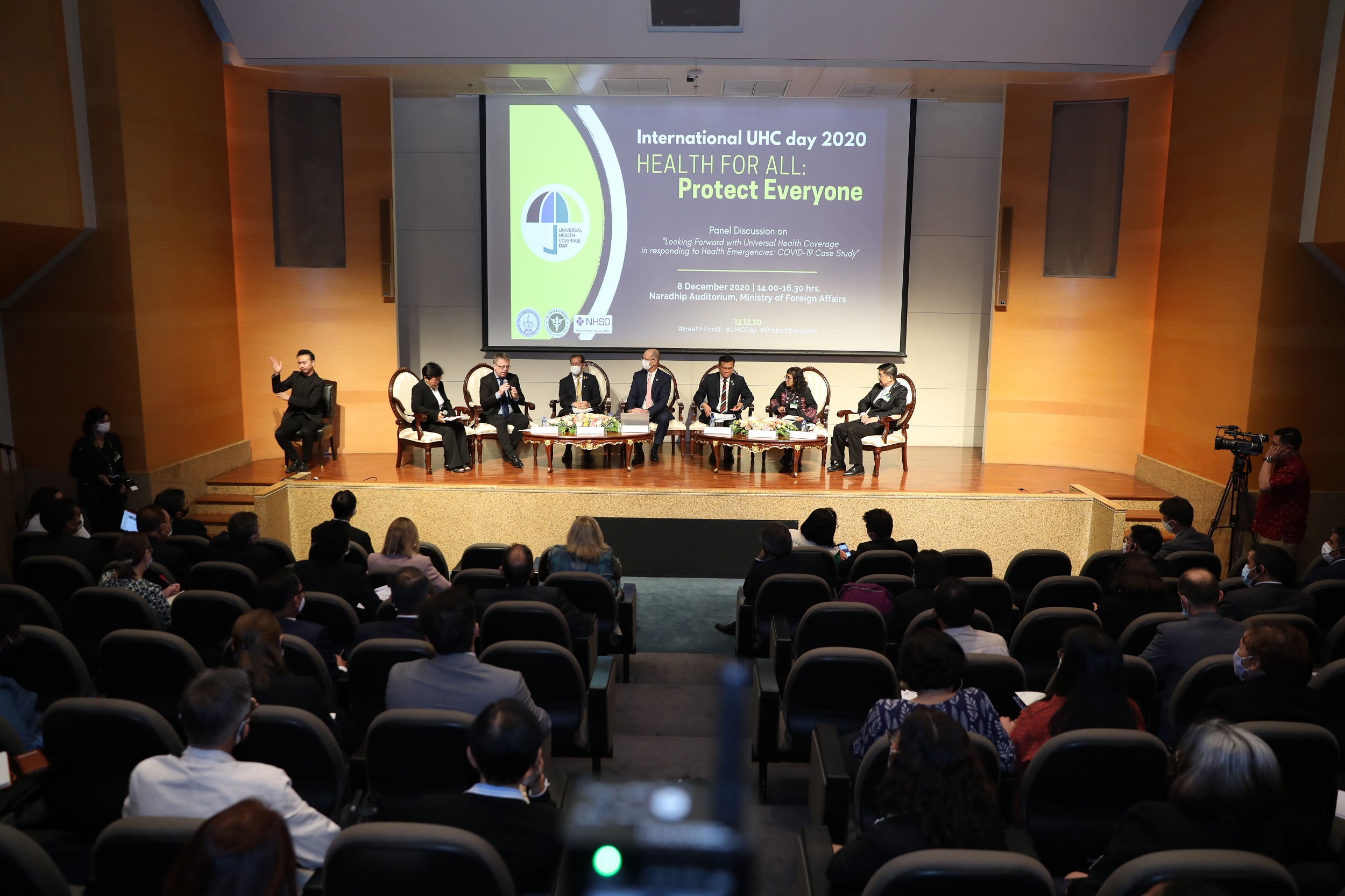
- Home
- DescriptionNews
Thailand rises as the forefront of global health agenda

December 9, 2020 — Universal Health Coverage (UHC) is an essential element in building strong health systems, strengthening health emergency response, and the corporation among global communities.
In celebrating the International UHC Day, National Health Security Office (NHSO) in collaboration with Thailand's Foreign Affairs Ministry and Public Health Ministry held a panel to discuss the role of UHC in strengthening human and health security. The lesson learned was taken from the global communities’ and Thailand’s experiences in managing the coronavirus pandemic.
Thailand introduced UHC in 2002 after Thai governments had aggressively expanded healthcare facilities in rural areas and trained health workforce for over two decades.
“Our strong health systems is a result of our long-year commitment in health development and investment,” said NHSO secretary-general Dr Sakchai Kanjanawatana during the Tuesday panel at the Ministry of Foreign Affairs.
“UHC is the result of that commitment, and it is one of the major reasons that help us coping with the COVID-19 pandemic effectively.”
UHC allowed the Thai government to mobilize resources, especially health funding, to support health emergency response. NHSO, which has received UHC budget from Thai government annually, can diverse the funding to necessary health services, including free COVID-19 testing and treatment provided to Thais and foreigners living in Thailand.
Mobilizing health funding also enables Thailand to increase coronavirus laboratories from two to over 200 labs in different locations within a few months, and support local governments and communities in conducting COVID-19 surveillance in their areas.
“Some new services were launched during the height of the pandemic, including telemedicine and [NHSO] mobile application that provides consultation to UHC members. These would never happen if we don’t have resources under UHC,” said Dr Sakchai.
Build health capacity and networks
“The role of UHC does not only focus on human rights. It’s also a critical element of pandemic preparedness and health security in general,” said Dr Richard Brown from the World Health Organization, Thailand Office.
“It’s very hard to think of any countries that have managed to effectively control the pandemic that does not have UHC enshrined as one of the major health policies.”
However, he added that some countries with strong UHC had also failed to control the pandemic effectively. One of the examples is the United Kingdom (UK) that established National Health Service in 1946 to provide free healthcare access to every British citizen.
“The UK has roughly the same population as Thailand, and the trajectory of COVID-19 has been very different. Not really what I have expected,” he said.
“Part of the answer to this is, although we have strong UHC in the UK. We probably have not paid sufficient attention to developing health security in the same way Thailand has done. I think it’s interesting in Thailand where you can point at individual areas where capacity can be strengthened.”
Dr Sura Wisetsak, Deputy permeant secretary of Thailand’s Public Health Ministry, said during the panel that Thailand had put effort into strengthening primary healthcare to close the gap between geographical areas.
In the last 40 decades, Public Health Ministry has established pervasive networks of hospitals at regional, provincial, and district levels. It has also built the capacity of village health volunteers who play a role as a connector between local communities and health providers.
With strong health networks and partnerships with multi-stakeholders, said Dr Sura, winning COVID-19 is possible.
“The pandemic has shown us that leaving health workforce to handle with the disease control is not enough,” said Soontri Hatti Sengking, President of the Foundation for Labour and Employment Promotion.
“Ensuring people’s participation in health promotion and disease prevention is essential to close the gap in health systems and strengthen the country’s capacity to deal with the health crisis.”
Forefront of the global health agenda
Thailand began its journey toward global health cooperation since many decades ago. Solid cooperation has been established with the United States, one of Thailand’s major partner countries for over 40 years.
Dr John R. MacArthur, the CDC Southeast Asia Regional Office’s Regional Director, said that Thailand and the United States had collaborated in many areas, including surveillance, research, workforce, and laboratory. Both countries have worked together to set up the first international Field Epidemiology Training The program aims to build the capacity of health workforce in many countries.
Nadhavathna Krishnamra, Director-General, Department of International Organization, Ministry of Foreign Affairs said Thailand had started its health diplomacy as early as the 1990s and became the forefront of global health security agenda.
Since 2007, Thailand in partnership with six countries including Brazil, France, Indonesia, Norway, Senegal, and South Africa that co-founded the Foreign Policy and Global Health (FPGH) group had proposed a resolution at the UN General Assembly to recognize the importance of UHC to global health agenda.
Its resolution adopted in 2012, following by UHC being embedded in Goal 3 of the Sustainable Development Goals in 2015. In partnership with FPGH, Thailand also proposed a resolution to establish International UHC Day, which was adopted at the 72nd session of the UN General Assembly in 2017.
“We are particularly grateful to push UHC on the global agenda as well as the national agenda. We are sharing the perspective of UHC as it relates to COVID-19 and the challenges today,” said Mr Nadhavathna.
“UHC and COVID-19 remind us of the truth that no one is safe until everyone is safe, that UHC in Thailand is a strong guarantee of a robust health system for the Thai people and those living in Thailand.
But, also, it is a platform of cooperation with countries elsewhere particularly neighboring countries where they need to strengthen their own health system.”

